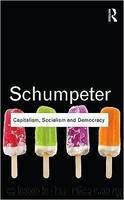Capitalism, Socialism and Democracy by Schumpeter Joseph A. & Joseph A. Schumpeter

Author:Schumpeter, Joseph A. & Joseph, A. Schumpeter [Schumpeter, Joseph A. & Joseph, A. Schumpeter]
Language: eng
Format: epub
Tags: Capitalism, Economics, Classics, Politics, Socialism, Business, Sociology, History, Philosophy, Non-Fiction, Political Science
ISBN: 9780203857090
Amazon: 0203857097
Goodreads: 9865813
Publisher: Routledge
Published: 1942-01-01T08:00:00+00:00
III. HUMAN NATURE IN POLITICS
It remains to answer our question about the definiteness and independence of the voterâs will, his powers of observation and interpretation of facts, and his ability to draw, clearly and promptly, rational inferences from both. This subject belongs to a chapter of social psychology that might be entitled Human Nature in Politics.7
During the second half of the last century, the idea of the human personality that is a homogeneous unit and the idea of a definite will that is the prime mover of action have been steadily fadingâeven before the times of Théodule Ribot and of Sigmund Freud. In particular, these ideas have been increasingly discounted in the field of social sciences where the importance of the extra-rational and irrational element in our behavior has been receiving more and more attention, witness Paretoâs Mind and Society. Of the many sources of the evidence that accumulated against the hypothesis of rationality, I shall mention only two.
The oneâin spite of much more careful later workâmay still be associated with the name of Gustave Le Bon, the founder or, at any rate, the first effective exponent of the psychology of crowds (psychologie des foules).8 By showing up, though overstressing, the realities of human behavior when under the influence of agglomerationâin particular the sudden disappearance, in a state of excitement, of moral restraints and civilized modes of thinking and feeling, the sudden eruption of primitive impulses, infantilisms and criminal propensitiesâhe made us face gruesome facts that everybody knew but nobody wished to see and he thereby dealt a serious blow to the picture of manâs nature which underlies the classical doctrine of democracy and democratic folklore about revolutions. No doubt there is much to be said about the narrowness of the factual basis of Le Bonâs inferences which, for instance, do not fit at all well the normal behavior of an English or Anglo-American crowd. Critics, especially those to whom the implications of this branch of social psychology were uncongenial, did not fail to make the most of its vulnerable points. But on the other hand it must not be forgotten that the phenomena of crowd psychology are by no means confined to mobs rioting in the narrow streets of a Latin town. Every parliament, every committee, every council of war composed of a dozen generals in their sixties, displays, in however mild a form, some of those features that stand out so glaringly in the case of the rabble, in particular a reduced sense of responsibility, a lower level of energy of thought and greater sensitiveness to non-logical influences. Moreover, those phenomena are not confined to a crowd in the sense of a physical agglomeration of many people. Newspaper readers, radio audiences, members of a party even if not physically gathered together are terribly easy to work up into a psychological crowd and into a state of frenzy in which attempt at rational argument only spurs the animal spirits.
The other source of disillusioning evidence that I am going to mention is a much humbler oneâno blood flows from it, only nonsense.
Download
This site does not store any files on its server. We only index and link to content provided by other sites. Please contact the content providers to delete copyright contents if any and email us, we'll remove relevant links or contents immediately.
International Integration of the Brazilian Economy by Elias C. Grivoyannis(111059)
The Radium Girls by Kate Moore(12028)
Turbulence by E. J. Noyes(8049)
Nudge - Improving Decisions about Health, Wealth, and Happiness by Thaler Sunstein(7706)
The Black Swan by Nassim Nicholas Taleb(7129)
Rich Dad Poor Dad by Robert T. Kiyosaki(6632)
Pioneering Portfolio Management by David F. Swensen(6300)
Man-made Catastrophes and Risk Information Concealment by Dmitry Chernov & Didier Sornette(6019)
Zero to One by Peter Thiel(5802)
Secrecy World by Jake Bernstein(4753)
Millionaire: The Philanderer, Gambler, and Duelist Who Invented Modern Finance by Janet Gleeson(4478)
The Age of Surveillance Capitalism by Shoshana Zuboff(4292)
Skin in the Game by Nassim Nicholas Taleb(4248)
The Money Culture by Michael Lewis(4207)
Bullshit Jobs by David Graeber(4190)
Skin in the Game: Hidden Asymmetries in Daily Life by Nassim Nicholas Taleb(4006)
The Dhandho Investor by Mohnish Pabrai(3765)
The Wisdom of Finance by Mihir Desai(3747)
Blockchain Basics by Daniel Drescher(3582)
